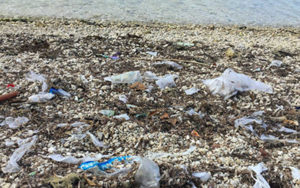
23 August 2106
This year, Saturday, 17 September is International Coastal Cleanup Day. It is a great opportunity for every organization to get your staff, supporters, friends, and people in your local community together for positive action with immediate results.
Why plan a coastal Cleanup event on this day?
1) Data! It is an important opportunity to collect data from around the world. It shows the size of the problem and the types of waste. This information shows policy makers and the general public about the serious problem of trash and plastics. 2) Create a positive sense of community – locally, nationally, and around the world. Your volunteers will feel good about doing something positive for their own community. They will also feel good to know that they contributed to something even bigger.
Coastal Cleanup Day was started by the Ocean Conservancy in the USA in 1986. Over the past 30 years, it has become a truly international event.
Plan Your Event!
You have a month to plan and organize your event. Here are some tips to help you get started. There are more details on the Coastal Cleanup Day website.
Before the Cleanup
- Go to the Checklist-1 to be sure you have thought of the basics.
- Select a site (beach, river, etc.) and register your event. Check with your national coordinator and/or local authorities. You can register your event on the International Coastal Cleanup Day site.
- Get the word out. You can use flyers or posters, emails, Facebook and Twitter, local press, and word of mouth to find your volunteers.
- Plan – Check the site for safety issues. Be sure that you have a good plan to dispose of the trash correctly after it has been collected.
During the Cleanup
- Look at the Checklist-2 to see what is recommended for the Cleanup Day.
- Check the site again to be sure it will be safe.
- Brief the volunteers.
- If you can, bring a scale to weigh the trash.
- Record your data. Data sheets are available to download. And you can also use the Clean Swell App. Be sure to download it and register in advance.
- Take photos.
- Have fun!
After the Cleanup
- Send your data to the Ocean Conservancy.
- Thank your volunteers right away! Send an e-mail with a photo of the trash that was collected. Post photos of your event on Facebook and Twitter to thank them and show the result of their work.
- Write down your “lessons learned” to make your next year’s cleanup event even better.
The Best Volunteer Turnout
The PHILIPPINES had the best volunteer turnout among 92 countries last year. Gerry Reyes, National Coordinator International Coastal Cleanup (ICC) Philippines, told me that they covered an impressive 1000 sites in 47 provinces.
Check their website for more information on this year’s activities coordinated with the Philippine Coast Guard Auxiliary.
The Greatest Volume
More than 4.6 million kilogram of trash was collect in HONG KONG last year. That is more than 2 times as much as the USA (1.8 million kg) or Kuwait (1.1 million kg).
You can get involved in this year’s Hong Kong Cleanup organized by Ecozine and The Nature Conservancy. Or you can just look at their website for inspiration.
Go Upstream
What washes down the rivers ends up on the beaches. Going upstream helps keep trash from getting to the ocean. In URAGUAY, events are planned up the river as well as on the beaches. Coordinated by the Ministry of housing, land use planning, & environment (contact cristina.quintas@mvotma.gub.uy).
Get in the Water
PADI’s Project Aware encourages their dive centers to participate in cleanup actions. If you would like qualified divers to help cleanup the reef, contact them to see if there is a dive center who can help near you.
For Asia Pacific contact info@projectaware.org.au
For Europe, Middle East and Africa info@projectaware.org.uk
Prepare Your Volunteers
“Please bring hat, organic or home made sunblock, organic bug repellent, gloves for trash picking, bottle of water, waterproof boots,” is the advice from Ecopazifico to volunteers going to Juanchaco Beach in COLUMBIA.
Every Day Can Be Cleanup Day
With the large amount of trash and plastics on most beaches in the world, cleanup events can be organized any time. There are regular cleanups scheduled in AUSTRALIA and SINGAPORE. For dates and more information you can contact these groups:
BeachCare , Griffith University Centre for Coastal Management
Tangaroa Blue Foundation
Contact: Heidi Taylor at info@tangaroablue.org
Plan your event now – everyone working together makes a big difference!
